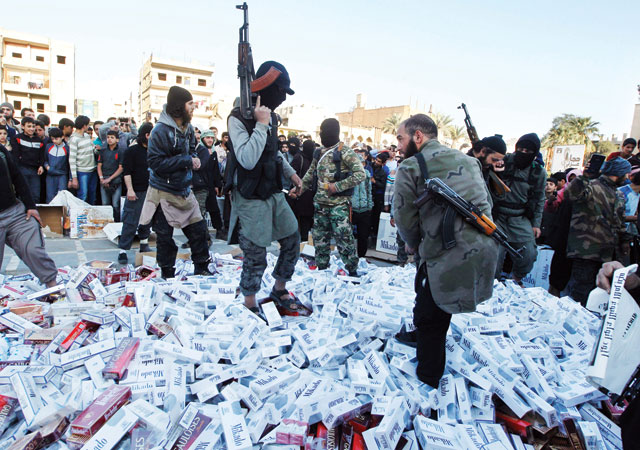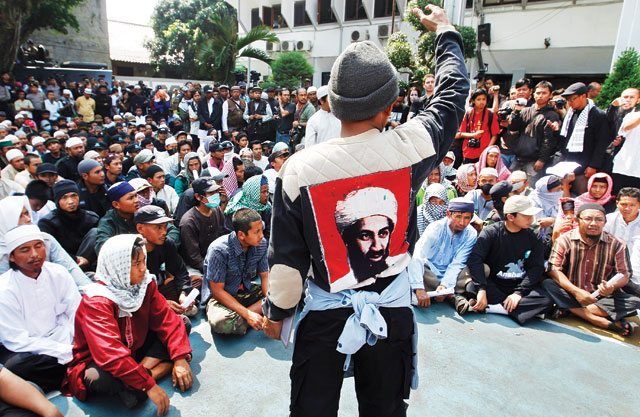Ali Fauzi, a former member of militant group Jemaah Islamiyah (JI), received word in February that a former student of his had died in Iraq. Wildan Mukhollad bin Lasmin, a member of the Islamic State of Iraq and the Levant (Isis), had carried out a suicide car bomb attack in Iraq. He was 19 years old.
Bin Lasmin hailed from Lamongan, West Java, where he studied at the Al-Islam Pesantren – an Islamic boarding school where Fauzi is a teacher – until his older brother took him to Cairo to continue his studies.
“I never saw him again [after his brother took him], until I heard the news about his death,” said Fauzi, whose two older brothers, Amrozi (aka The Smiling Assassin) and Ali Ghufron, were executed by firing squad in 2008 for their roles in the 2002 Bali bombings that killed 202 people.
A report entitled Indonesians and the Syrian Conflict, released in January by the Jakarta-based Institute for Policy Analysis of Conflict (IPAC), referenced the death of another Indonesian in Syria. Riza Fardi, also known as Abu Muhammad al-Indunisi, was reportedly fighting a jihad, or holy war, against the regime of Syria’s President Bashar al-Assad.
Marty Natalegawa, Indonesia’s minister of foreign affairs, told Southeast Asia Globe that besides data relating to Indonesian nationals in conflict situations who need to be repatriated, the ministry doesn’t have specific figures on those engaged in conflicts abroad. He did acknowledge, however, that there have been suggestions of Indonesian nationals who have deliberately put themselves in a conflict situation for the purpose of engaging in it.
“Purely from the perspective of citizens’ protection, we cannot condone such activities because our nationals are putting themselves in potentially harmful situations, bringing difficulties upon themselves and no doubt grief upon their families,” Natalegawa said.

Wawan Purwanto, a terrorism and security expert from the University of Indonesia, said Indonesians have been waging jihad abroad since the 1970s. “This is not something new, only the persons involved are different. It has been going on for generations and [these current fighters] have taken examples from older family members or friends with the same affiliation,” Purwanto said, adding that Indonesia is one of a number of countries whose citizens are involved in foreign wars in the name of Muslim solidarity. “They don’t see it as a domestic politics [issue] but rather as being oppressive to Islam. They go on jihad as an individual and don’t represent the country [they come from].”
One such fighter is Machmudi Hariono, an Indonesian who was a guerrilla with the Moro Islamic Liberation Front (MILF) for two years. From the age of 23, he fought against the Philippine Armed Forces after President Joseph Estrada’s administration declared war against the MILF in March 2000. Hariono, whose battle name is Yusuf, said that news of Wildan’s death brought back memories of his own jihad days. “I pray that God bless his soul for he died as syahid [a martyr], which I believe was his own calling to defend fellow Muslims there,” Hariono said. “The jihad was for a similar cause [to the MILF struggle], only at a different time and in a different place.”
Hariono, who hails from Jombang in East Java, first felt the urge to go on jihad in the 1990s after watching news coverage of the Muslim genocide in Bosnia, which helped him decide to dedicate himself to defending oppressed fellow Muslims.
I read various literatures [on jihad] and I wanted to know for myself what the situation was really like.
Machmudi Hariono
The opportunity presented itself in December 1999 when he left Surabaya with a group of fellow mujahideen (those who struggle in the path of Allah), thinking he was going to fight alongside fellow Muslims in communal clashes that were occurring in Ambon, Maluku and Poso in South Sulawesi, Indonesia. “Our group leader took us zigzagging between Kalimantan and Sulawesi. We met another mujahideen group in Sulawesi, yet we still didn’t know where we were going. We ended up in Malaysia and from there we entered the Philippines and joined the MILF,” said Hariono.
When the hostility in Mindanao dwindled in 2002, Hariono left, thinking that he could continue his jihad in Ambon or Poso, but the tensions there had also decreased due to the brokering of the Malino II Accord, which was signed on February 13, 2002. He returned to Jombang and eventually settled in a rented house in Semarang, Central Java, which was later used as a JI explosives den. Hariono was arrested in July 2003 for having explosives in his possession and in 2004 was sentenced to ten years imprisonment. He served five-and-a-half years of his sentence and was released on parole in 2009. Now he runs a car rental business in Semarang and also co-manages a steak restaurant.

This year’s IPAC report stated that, unlike previous foreign conflicts in which Muslims have been oppressed, the conflict in Syria holds greater allure for Indonesian extremists, including those who are part of JI. “The JI believes that the war in Syria is a much more legitimate war. It is not worth fighting in Indonesia any more – the cost is too high and the victims are fellow Indonesians,” said Sydney Jones, director of IPAC.
Despite the conviction that jihad is to defend fellow Muslims, Maman Ilmanulhaq, head of Al-Mizan Pesantren in Majalengka, East Java, discourages Muslims from getting involved in physical combat because doing so, driven by pure emotion and without clear or rational thinking, can result in more problems than solutions. “We need to fully understand the principle of jihad to defend the truth and it could be by contributing our thoughts, efforts and active involvement in diplomatic or humanitarian channels, but not in physical combat,” Ilmanulhaq said. “I respect [the jihadists’] choices to defend the religion but it is regrettable that their actions were not driven by rational consideration. It is too bad that our young people should go and sacrifice themselves for the wrong kind of heroism.”
Da’i Bachtiar, former chief of the Indonesian National Police, concurred. He said that there are other ways to fight for Syria and to call for an end to the violence there. “To wage jihad is a futile sacrifice and does not contribute to resolving the problem,” said Bachtiar, who has an honorary adjunct professorship in counterterrorism from Australia’s Edith Cowan University.
There are also fears that the jihadists’ return to their home countries – with the combat skills they have learned – might revive violent radical movements in those places.
Even though IPAC’s report suggested it would be premature to consider such a situation, Indonesia is acutely aware of the risk of renewed violence, no matter how small the possibility, and Jakarta has been reminding the world that conflicts on foreign soil can have an impact on home turf.
“People who were in a conflict situation and have returned to Indonesia, in terms of their outlook or capacity, can be problematic for us. That’s why, whenever we attend international conferences on, say, Syria, or on other conflict situations, we constantly remind the world that such situations become a ground rife for further complications elsewhere,” foreign minister Natalegawa said.
Purwanto of the University of Indonesia said there is the possibility that these returned jihadists could create a new hotbed of radicalism in the archipelagic nation, though the mujahideen now seem to have a different take on their cause. “Some of them don’t agree with carrying out attacks here and don’t think that that their real battlefield is here,” Purwanto said, adding that he feels the returnees should still be closely monitored.
The government can approach jihadist alumni groups, collect their data and assist them in assimilating properly with the general public to prevent them from venting their post-combat stress.
Purwanto
Purwanto also thinks there should be measures put in place to thwart known jihadists departing Indonesia again. Tracking them would not be easy, however, as they are known to ditch their true identities, change their appearance and use aliases or combat names, he said.
There is a less conventional way to keep an eye on them, according to IPAC’s Jones, with many struggling to go without Indonesian food for a long period of time. “They may want to have a taste of home from time to time and they may appear when there are festivities such as the August 17 Independence Day celebrations, when Indonesian food is served,” she said, adding that the Indonesian government should also ramp up its crackdown on corruption within its immigration office in order to suppress the rampant trade in false passports, which aspiring jihadists can use to freely travel abroad.
The former combatant Hariono disagrees with such measures. He said aspiring jihadists have the right and the freedom of choice to experience the world for themselves, as long as they are aware of the risks. “I don’t regret my combat experience and it is part of the history of my life,” he said. “Now I know better and can take my own standpoint on the matter because I’ve seen it for myself.”

